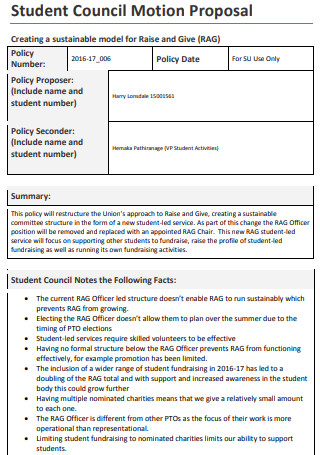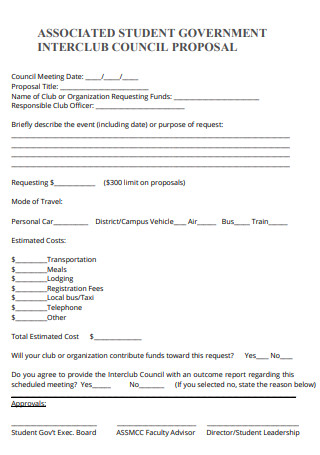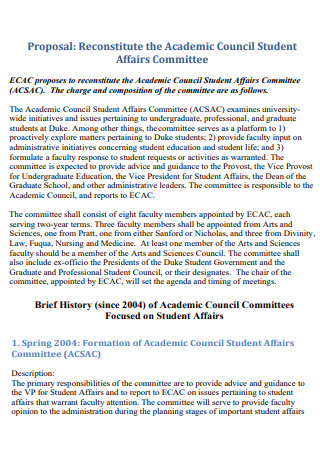10+ SAMPLE Student Council Proposal
-

Student Council Motion Proposal
download now -

Student Council Sponsored Event Proposal
download now -

Student Council Proposal Form
download now -

Student Success Council Proposal Review Process
download now -

Graduate Student Council Project Proposal Form
download now -

Associated Student Government Council Proposal
download now -

Middle School Student Council Fundraising Proposal
download now -

Academic Student Council Affairs Committee Proposal
download now -

Student Council Resolutions Proposal
download now -

Engineering Student Council Proposal Form
download now -

Student Council Election Proposal
download now
FREE Student Council Proposal s to Download
10+ SAMPLE Student Council Proposal
a Student Council?
Benefits of Joining The Student Council
Elements of a Student Council Proposal
Ideal Characteristics of a Student Leader
How To Focus as a Student Council Leader
FAQs
How do you become a member of the student council?
Does the student council make an excellent college application?
Are first-year students eligible to join the student council?
What Is a Student Council?
The most well-known school organization is the student council, run by students and regulated by teachers and school administrators. Establishing a student council in schools aims to provide students with opportunities to develop leadership skills through organizing and implementing school events and initiatives. Also, the student council serves as the collective voice of the student body. The ability to communicate issues, thoughts, and interests to the entire class, school, and community and elect student council members goes through an electoral procedure in which the school chooses the members. According to statistics, 91 percent of Americans believe that pupils perform better when they exercise their leadership abilities outside the classroom.
Benefits of Joining The Student Council
Being elected to your high school’s student council provides an unparalleled chance for personal development. Not only do you get to advocate for your peers and work on issues that are important to you, but you also get the opportunity to learn from others and build skills that will help you both at university and on the job. The following are some reasons to join your high school’s student council.
Elements of a Student Council Proposal
A student committee is a group of selected and recruit students who work with an adult advisor within the framework of a school to supply a means for student expression and assistance in school affairs and activities, provide possibilities for student leadership experience, and promote student-faculty and community relations. If you’re still interested, here are the components of a proposal for a student council.
Ideal Characteristics of a Student Leader
Possibly influential people have a goal in mind and can achieve it through inspiring and persuading others to join them. However, is that sufficient? After all, history is packed with examples of influential leaders who were not admirable. Thus, it is evident that having a competent leader is insufficient. Apart from effectiveness, a leader must be morally upright and exhibit various other venerable characteristics. Thus, what factors do a good, effective leader possess?
-
1. They are goal-oriented and honest.
Student leaders are aware of the lesson’s aim and are motivated to accomplish it. They aspire to personal accomplishment and organically set goals and those established by the teacher. Also, trustworthy student leaders are devoted to conducting themselves ethically. The remainder of the class knows that they can rely on this student, whether in personal relationships or while completing group assignments. If someone in the course attempts to cheat, this leader will call them out or, at the absolute least, will refuse to cooperate.
2. They are diligent workers.
Work ethic is contagious. If a single student works diligently and has a genuine enthusiasm for the subject, they will inspire others to feel that they, too, can (and should) strive for excellence. In summary, diligent student leaders inspire and motivate their peers to do more. Leaders desire the best for others and go above and beyond to assist those in need. This is best demonstrated in a classroom context by acts of kindness or sacrifice. Is someone being bullied, for instance? Unlike passive pupils, a student leader is more likely to intervene and end it.
3. They pay close attention.
Student leaders are interested in and receptive to the opinions and concerns of their peers. While some students may feign interest in the difficulties of others, a strong student leader is likely to demonstrate a genuine interest in and desire to assist others. Also, they are more responsive to feedback from others and willing to compromise when working in groups. Additionally, student leaders convey their thoughts to the rest of the group. If they have an opinion about how things should be done, they express it openly and respectfully.
4. They are capable of making wise decisions.
Student leaders assess a problem and make an informed decision on the best course of action. Finally, effective decision-making requires a strong feeling of duty, a clear sense of direction, and the ability to think fast under duress.
5. They take responsibility.
When anything goes wrong, student leaders do not deflect blame or create excuses; instead, they accept responsibility for their actions. Then they use what they’ve learned, make any corrections, and continue forward. When it comes to victory, these leaders are likely to be humble and acknowledge their team’s work rather than their own.
How To Focus as a Student Council Leader
When you are elected to serve on the student council, you are given a once-in-a-lifetime opportunity to effect change. That is why it is critical for Student Council members to develop Leadership Qualities. True, some leadership characteristics may appear natural. However, some require more attention.
-
1. Confidence
Confidence and arrogance are two distinct concepts. Self-confident individuals possess this calm yet robust feeling of self. They do not have to be outspoken or authoritative to garner attention. They include this quality that motivates people to feel secure. Developing your self-confidence entails making the best use of the trust bestowed upon you. When you can convince others that they, too, can overcome any obstacle, you are on the right course.
2. Humility
Humility and self-confidence go hand in hand. The final thing you should do is brag about your accomplishments. You have not been elected to tell others what to do. You were not chosen to enjoy privileges. You have this opportunity to motivate people to achieve their full potential. Also, this is an opportunity to hone your talents and develop into a reputable individual. Humility also entails the ability to share one’s achievement with others. Bear in mind that a team always backs you up. Additionally, humility entails accepting responsibility for one’s errors. Others may find it challenging to get their flaws. However, it is a necessary skill for any leader to learn.
3. Resilience
Things are not consistently going to go your way. There will be several occasions when you fall short or make poor choices. What important is that you do not allow it to defeat you. You grow from the experience and re-establish your footing. Resilience is an incredibly admirable quality to possess in a leader. It will help improve your ability to take on tasks and detach your emotions from the job at hand.
4. Time Management
You’ll be managing schedules, assigning work, and achieving objectives. It might be too much to manage. As a result, you should work on time management is another leadership ability. We all have the same number of hours in a day. It makes no difference whether you only have three hours today. What counts is how effectively you use those three hours. True leadership mastery is learning to prioritize essential duties, multitask well, and still have time to rest.
5. Communication Skills
Effective leadership requires effective communication. It will not function if you cannot connect with your fellow students, leaders, and instructors. What you wish to do will not resonate with others. Enhance your communication abilities. Be adaptable in your interactions with diverse groups of individuals. Develop a more objective and receptive mindset. While you should value others’ opinions, you should also learn to discern what matters and what does not. Improve your listening skills rather than talking over others.
FAQs
How do you become a member of the student council?
If you wish to serve on the student council, you will require credentials. Participate in your school’s activities. The more experience and qualifications you have on your Curriculum Vitae, the more qualified and experienced you will appear for the position. Join an after-school group about which you are passionate.
Does the student council make an excellent college application?
Everyone is aware that being a student council member looks excellent on a college application. However, student council may help you develop more than just leadership and cooperation abilities; it can also help you create memories, relationships and even learn about your aspirations.
Are first-year students eligible to join the student council?
Elections for the freshmen student council typically occur in the fall at the start of the school year. Make sure to speak with your school’s front office about registering to run for student government.
Once you’ve completed composing the proposal, evaluate it thoroughly to ensure no errors in your written details. Sign the proposal to conclude it. Then, discuss it with your facilitator, fellow student council members, and school administration to achieve an agreement to proceed with the project and develop plans for its practical completion. To assist you in getting started, download our free example proposal templates above and use them as a guide!
